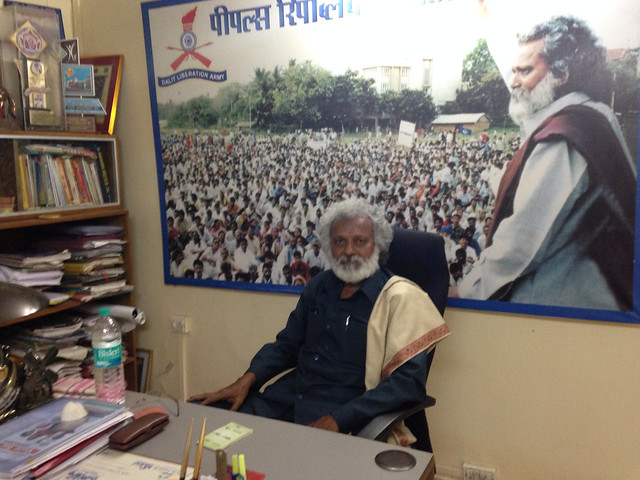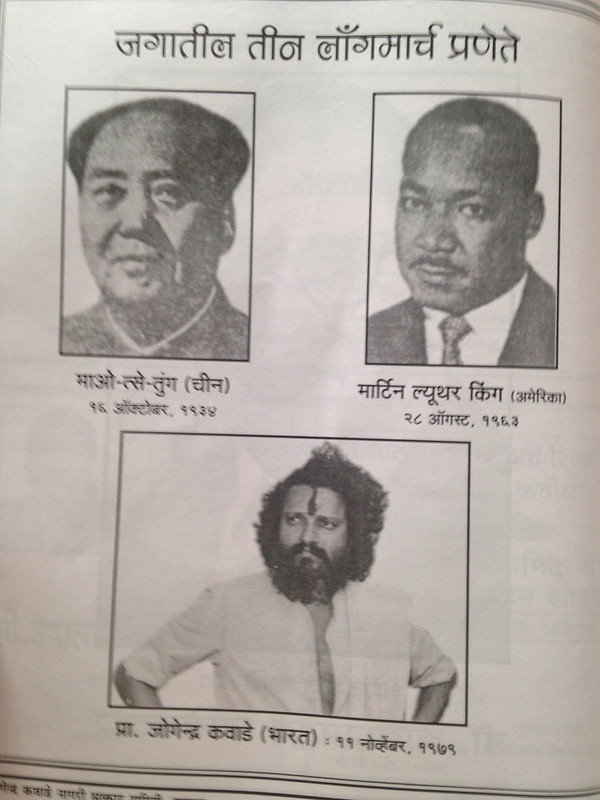By Vanya Mehta, TwoCircles.net,
In Maharashtra, the galvanization of political power on the basis of empowerment of scheduled castes has taken a backseat due to fractionalization. Though this is a well known phenomena, the BSP is attempting to capitalize on the failure of other Dalit-issue-based parties like the Republican Party of India(RPI), a product of the Scheduled Castes Federation founded by Dr. B. R. Ambedkar, which is now in shambles with over 50 different splintered groups.
Around 20,000 supporters filled a massive outdoor tent on April 13, 2014, to hear BSP President and former four-term Chief Minister of Uttar Pradesh, “Behenji” Mayawati Kumari, discuss the status of the Dalits, Muslims, and the poor in Mumbai. Though she did not make many lofty promises, Mayawati did say she would build two-room homes for the slum dwellers if elected.

Mayawati statue that she got built in Lucknow
Mayawati is a character who attracts controversy: her office in Lucknow bordered by massive stone walls, the monument devotions to BSP founder Kanshi Ram, and even statue tributes to herself erected across the city stir resentment among all classes.
Despite the minimal electoral gains for BSP in Maharashtra, the crowd of thousands of supporters indicate that the ideology holds strong. From 1 p.m. till 6 p.m. the supporters waited for Behenji to arrive from where she was delivering a speech in Aurangabad. Around 10 buses were also arranged by the BSP party workers to bring people from the different corners of Bombay to the venue, in front of the Somaiya Hospital in East Sion.
For the Lok Sabha election, Mayawati picked candidates from a variety of religious backgrounds and castes. “BSP gave me a ticket even though I am a Brahmin!” one candidate, Pushpa Bhole, for the Northwest constituency, proclaimed to an enthusiastic and supportive response from the audience.
BSP candidate standing from Mumbai South Central constituency, Ganesha Aiyer, is an advocate who launched his own independent legal practice. Mr. Aiyer, who was born and brought up in the famous Dharavi slums, claims that the people of that slum know him well. He does some pro bono legal cases for the community as well and is a social activist. He generously predicted out of 48, the BSP would win 15 seats at least in Maharashtra.
“Till today, the Dalit people were scattered, going into RPI parties,” Mr. Aiyer said to me before the rally. “Now they have come to understand that our main leader is Behenji Mayawati. Now even these people are united and they are going to vote for us.”
A round of applause for Mayawati came strongest during the speech when she ensured that atrocities will no longer happen to Dalits. “If they happen, I will be sure that those accused go to jail,” she said.

Jogendra Kawade
“Democracy has four pillars, that is executive, legislatures, Judiciary, and Journalism,” wrote Uttam Shewde, in the forward to a book of Kanshi Ram’s speeches and writings. “In order to have checks on ruling classes and ruling parties, our own independent force of journalism is a must.” To that end, a group of BSP activists were recording the event to livestream on the internet.
Unlike the BJP and the Congress, the BSP does not own or pay off any particular news channel due to lack of funds. A group of young BSP activists live streamed the event through their own means and a few others from local channels were there to record the speech. Many of the activists are young, middle class beneficiaries of the quota system and have devoted their lives to empowering others who do not have access to proper education or employment opportunities.
One young activist* who works for an IT firm went to a school named after Dr. Ambedkar and funded by the government, which took tuition of 1 rupee a month. Her grand parents converted to Buddhism when Babasaheb Ambedkar took lead. Another such young activist graduated and began a Buddhist professionals Facebook groups to launch Webinars and educational seminars. Each Facebook group is specific to an industry and chooses a particular expert who can “nurture youth talent” through professional counseling. These efforts to empower the Dalit community have extended to at least 7,500 people who are utilizing the Facebook group.
Maharashtra is the seat of a longstanding Dalit movement that featured figures as renowed as Namdev Dhasal, the founder of the Dalit Panthers movement, who recently passed away. The Dalit Panthers, an organization founded in 1972, appears to have peaked in the ‘70s and ‘80s. The tapering out of the movement has led to a certain sense of discontent among dalit activists and politicians.

Jogendra Kawade, the founder of the People’s Republican Party of India, sat with me to discuss Dalit politics and his goals. Mr. Kawade formed the Dalit Liberation Army, which is a social organization that seeks to help those Dalits who are facing discrimination. His pamphlet describing the work of the political party largely features photographs of himself with various other leaders and also a likening of himself to Martin Luther King.
Kawade who graduated from Nagpur University in business administration, taught as a professor at the Ambedkar College in Nagpur for 30 years. He said that in 1998, the main Dalit leaders including himself and grandson of Dr. B.R. Ambedkar, Prakash Ambedkar, were elected as members of Parliament from Amravati, Akola, Mumbai, and Chimur. Unfortunately, they have not been able to unite since that year and he believes this is a source of problem for the strength of the movement.
“Unity is necessary,” he said. The main goals for his party, Mr. Kawade said, was that “reservations are not enough. Dalits should have share in power, administration, wealth, and land.”
Everybody needs a slice of the NDA or UPA pie. To that end, though Mr. Kawade’s party is under UPA and working with Congress, one faction of RPI led by Ramdas Athawale is under the BJP-Shiv Sena alliance. Funding contributes to the reason why one party veers to one side or another. Mr. Kawade said he chose Congress because he believed that they were still more open to caste issues than BJP. “To avoid the split among the secular vote, we decided joining UPA,” he said.
For a minority voting base, forming political parties requires compromise in the Dalit scene. While Mayawati has managed to consolidate power in Uttar Pradesh, this has not translated outside the state. Dalit politics as we know it has adapted to a new scenario. Mr. Pradip Gaikwad, a publisher of Ambedkar books based in Nagpur, believes that even if the Dalit parties combined, they would still not be able to put a member of Parliament in the Lok Sabha for long since the Dalits are still such a minority.
*Both young activists requested to remain anonymous.

